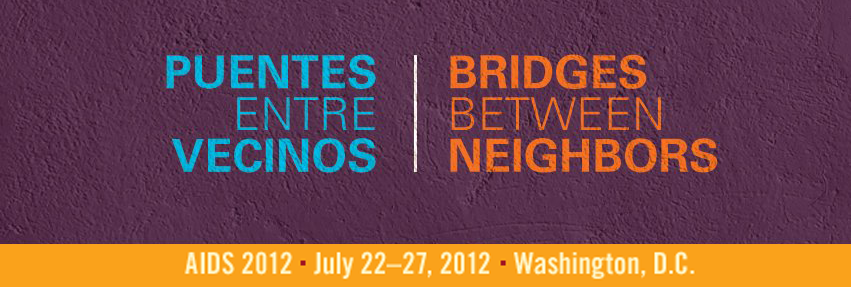Puentes Entre Vecinos: Increasing Knowledge, Dialogue and Representation of Latino/Hispanic and Caribbean Leaders at AIDS 2012
Topics

In less than a month, the world will come to the nation’s capital to discuss the latest scientific advances from around the world and to develop strategies for advancing all facets of our collective efforts to address the HIV/AIDS pandemic. The XIX International AIDS ConferenceExit Disclaimer (AIDS 2012) returns to the United States. And numerous Latino/Hispanic partners are working to highlight key HIV/AIDS issues impacting Latino/Hispanic communities at the conference thanks to the work of the National Latino AIDS Action Network (NLAAN).
As the fastest growing and youngest racial and ethnic group in the U.S., it is imperative that AIDS 2012 addresses the distinct needs of the diverse and dynamic Latino/Hispanic communities in the U.S. and its dependent areas. The biennial conference provides a great opportunity to re-energize the response to the domestic epidemic and focus attention on the particularly devastated populations, among them Latino/Hispanic communities. The impact and challenges of HIV/AIDS in Latino/Hispanic communities are well documented:
- In 2009, Latino men who have sex with men (MSM) accounted for 81% of new HIV infections among all Latino men and 20% among all MSM. Among Latino MSM, 45% of new HIV infections occurred in those under age 30 (CDCExit Disclaimer: August 2011).
- Latinas' HIV incidence rate is more than four times the rate for white women (CDC: November 2011).
- Among those who are HIV positive, CDC data indicate that over a third of Latinos (36%) were tested for HIV late in their illness; by comparison, 31% of Blacks and 32% of whites were tested late (CDC: March 2012).
- In 2010, three in ten Latinos/Hispanics (30.7%) were uninsured; by comparison, 20.8% of Blacks, 18.1% of Asians, and 11.7 % for non-Hispanic whites (HHS: September 2011).
With such alarming new HIV infection rates and health care access challenges, Latinos/Hispanics must be well-informed about the HIV/AIDS epidemic in the U.S., right? Not exactly. A report by the Kaiser Family Foundation further underscores some of the challenges HIV/AIDS providers and advocates face in reaching Latino/Hispanic communities when it comes to HIV/AIDS (Kaiser Family Foundation: June 2011).
- In 2004, 74 percent of Latinos/Hispanics reported seeing, hearing, or reading at least something about the HIV/AIDS epidemic in the previous year, a figure that declined to 54 percent in 2009 and 43 percent today.
- Latinos/Hispanics express a level of concern about contracting HIV that is somewhat higher than whites (27 percent vs. 11 percent say they are “very concerned”), but lower than that expressed by Blacks (40 percent).
- Latinos/Hispanic are somewhat more likely than whites and Blacks to express attitudes that may stigmatize people living with HIV.
In a time where we can truly Turn the Tide on the epidemic with new advances in HIV research, this is simply unacceptable. AIDS 2012 must serve as a call to ensure that the conference has a deep and lasting impact in the U.S. among Latino/Hispanic communities and all other impacted populations.
NLAAN, in partnership with several organizations, is working to make sure that Latino/Hispanic and Caribbean leaders are present and engaged in the week-long discourse. NLAAN is working with leaders in the U.S., Latin America and the Caribbean to host a series of activities and events before, during and after AIDS 2012. The goal of these activities and events is to build a regional wave of solidarity among community leaders from around the globe. Puentes Entre Vecinos: Bridges Between Neighbors is our theme for AIDS 2012. The theme suggests interconnection, harmony, unity, and solidarity across HIV stakeholders from around the world.
In the spirit of the theme, the Embajadores Program is designed to identify, mobilize, and support the next generation of Latino/Hispanic leaders in the field of HIV/AIDS, over 20 in total at AIDS 2012 from all ten regions of the conference and on activities that will be taking place in the Global Village and around Washington, DC. In addition to blogs, Embajadores will make all the information relevant to their everyday lives by organizing a conference hub in their respective communities.
We are also working with partners to host the Latino/Hispanic HIV Community Research Forum: Creando Una Red Para Un Futuro Sin VIH/SIDAExit Disclaimer taking place on Sunday, July 22 from 8:30 a.m.-5:00 p.m. at the Renaissance HotelExit Disclaimer. The forum will be a vehicle for Latino-centered dialogue and networking by key representatives from domestic HIV-serving organizations, community-focused researchers, and representatives from local, national, and international entities. The forum is free and open to the public. Registration is required and closes at 5:00 p.m. EDT on Monday, July 2, 2012.
For those looking for more free activities throughout the week, the Latino Caribbean Diaspora Collaborative (LCDC) Networking ZoneExit Disclaimer in the Global Village will showcase HIV/AIDS programs across the Caribbean, Central American, Mexico, South America, and the United States. As an interactive installation, it will provide educational, linguistic, cultural, social, scientific, and networking opportunities for attendees from around the world. Over 60 panel and roundtable discussions will be featured on a range of topics, including: aging, harm reduction, human rights, masculinity, biomedical interventions, transgender wellness and treatment, women, and immigrant populations. The space will also feature a series of videos from the region, youth activities and cultural displays.
As part of the AIDS 2012 Brown Bag Webinar Series, a webinar titled Roadmap and Updates for AIDS 2012Exit Disclaimer, is scheduled for Thursday, July 12, 2012 from 12:00-1:00 p.m. ET, featuring conference organizers who will provide updates on all the exciting activities and events planned in and around Washington, DC for AIDS 2012. NLAAN members will provide information related to the Latino/Hispanic Research Forum, LCDC activities and conference guidebook - Nuestra Guía: Latino/Hispanic and Caribbean Guidebook for AIDS 2012. The guidebook will provide orientation for Latino/Hispanic and Caribbean communities on key sessions, satellites, and events taking place during AIDS 2012.
To learn more about our efforts, please go to NLAAN.org/AIDS2012.